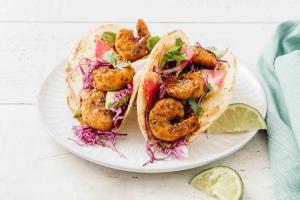Plant-Based Shrimp Market to Hit USD 3.2 Billion by 2035 as Sustainable Seafood Gains Momentum
Rising demand for eco-friendly seafood alternatives is fueling the growth of the plant-based shrimp market globally.
NEWARK, DE, UNITED STATES, August 12, 2025 /EINPresswire.com/ -- A new market analysis reveals the global plant-based shrimp market is poised for explosive growth, with a projected compound annual growth rate (CAGR) of 8.6% from 2025 to 2035. The market, valued at USD 1.4 billion in 2025, is forecasted to more than double to USD 3.2 billion by 2035, driven by a powerful consumer movement toward sustainable and cruelty-free food options. This growth is being fueled by increasing awareness of the environmental impact of traditional seafood and health concerns like mercury exposure and allergens.
The market, while a niche segment within the broader plant-based seafood and alternative protein markets, is gaining significant traction. It currently accounts for 14% of the plant-based seafood market and is experiencing accelerated growth across all parent segments, including the vegan food and sustainable food markets. A key driver of this expansion is the growing availability and quality of products, as manufacturers innovate to closely replicate the taste and texture of conventional shrimp.
Competitive Landscape and Market Dynamics
The plant-based shrimp market is moderately consolidated, with a number of influential players vying for market share. Established food giants like Beyond Meat, Inc. and Maple Leaf Foods, Inc. (through its Greenleaf Foods division) are leveraging their brand recognition and R&D capabilities to introduce compelling products. They compete with pioneering alternative seafood companies like Gathered Foods Corp. (Good Catch) and Finless Foods, which are focused on specialized, high-performance seafood alternatives and cutting-edge cultivated protein solutions.
A key competitive advantage lies in source ingredients. The analysis highlights that seaweed is set to dominate the source segment, capturing 42% of the market share by 2025. Its appeal comes from its sustainable profile, allergen-free nature, and natural oceanic flavor, which is crucial for consumer acceptance. This focus on high-fidelity taste and texture, along with clean-label and allergen-free claims, is a critical battleground for manufacturers.
Key Trends and Segment Leadership
The market’s expansion is defined by several key trends and leading segments. Frozen plant-based shrimp is a dominant force, projected to hold a 50% market share in 2025. This is attributed to its extended shelf life, convenience for both consumers and foodservice providers, and efficiency within the cold chain distribution network. Within the product type category, breaded vegan shrimp is expected to lead with a 36% market share, a testament to its familiar texture and widespread acceptance among flexitarian and vegan consumers.
The foodservice industry is a major growth driver, projected to account for 46% of the end-use segment in 2025 as restaurants and quick-service chains increasingly diversify their menus to meet evolving dietary preferences. Interestingly, the pharmaceutical application segment is also a powerhouse, with a 60% share, driven by the growing use of plant-based omega-3 and protein-rich ingredients in supplements and clinical nutrition.
Regional Outlook and Regulatory Influence
East Asia is the key growth region, with Japan leading the charge. Japan is projected to be the fastest-growing market globally, with a CAGR of 9.2%. This is driven by strong innovation in seaweed-based products and a cultural shift towards environmentally conscious food choices. The U.S. and U.K. markets are also showing steady growth at CAGRs of 8.3% and 8.2% respectively, while Germany and France are closely aligned with EU-wide food innovation policies, growing at 8.5% and 8.4%.
Government regulations are playing an indirect but significant role in market expansion. The analysis notes that frameworks around sustainable aquaculture and marine preservation, along with stringent labeling and food safety guidelines from bodies like the USA FDA and Europe’s EFSA, are prompting manufacturers to invest heavily in clean-label and environmentally friendly shrimp alternatives. These regulations build consumer trust and create a more transparent market for these innovative products.
Request Plant-Based Shrimp Market Draft Report - https://www.futuremarketinsights.com/reports/sample/rep-gb-13006
For more on their methodology and market coverage, visit https://www.futuremarketinsights.com/about-us.
Explore Related Insights
Plant-based Meat Market: https://www.futuremarketinsights.com/reports/plant-based-meat-market
Plant-Based Fish Market: https://www.futuremarketinsights.com/reports/plant-based-fish-market
Plant-based Tuna Market: https://www.futuremarketinsights.com/reports/plant-based-tuna-market
Editor’s Note:
The plant-based shrimp market reflects a broader shift toward sustainable diets, driven by environmental concerns, health awareness, and innovation in food technology.
Rahul Singh
Future Market Insights Inc.
+1 347-918-3531
email us here
Legal Disclaimer:
EIN Presswire provides this news content "as is" without warranty of any kind. We do not accept any responsibility or liability for the accuracy, content, images, videos, licenses, completeness, legality, or reliability of the information contained in this article. If you have any complaints or copyright issues related to this article, kindly contact the author above.

